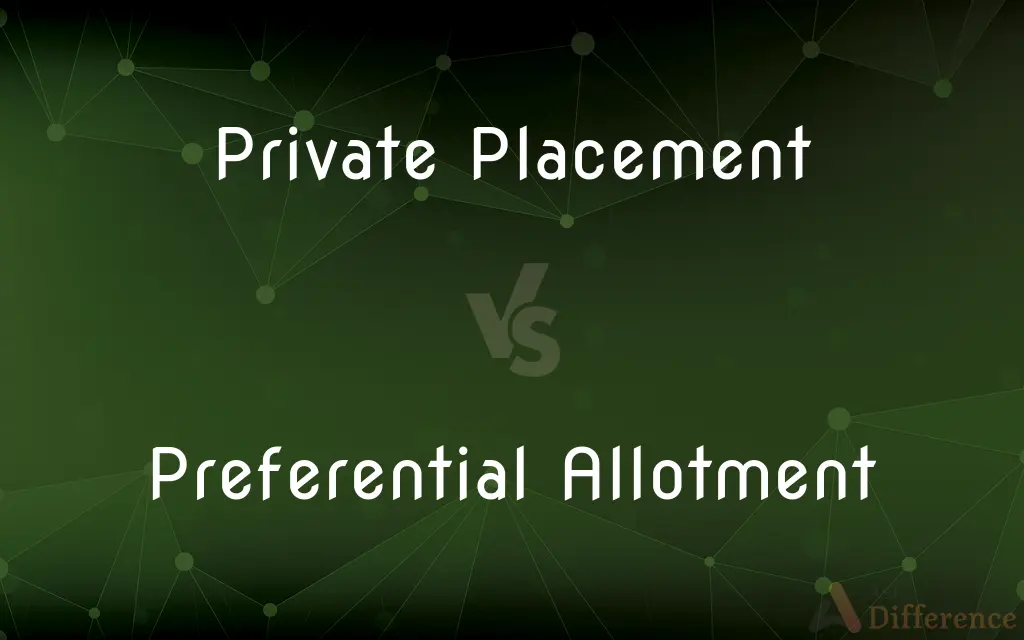Private Placement vs. Preferential Allotment — What's the Difference?
Edited by Tayyaba Rehman — By Fiza Rafique — Published on December 26, 2023
Private Placement is the sale of securities to a select group of investors. Preferential Allotment is issuing shares to specific entities at preferential terms. Both bypass public markets.

Difference Between Private Placement and Preferential Allotment
Table of Contents
ADVERTISEMENT
Key Differences
Private Placement refers to the process in which securities, either shares or bonds, are directly sold to institutional investors or a select group of individuals. Preferential Allotment, on the other hand, pertains to the issuance of shares by a company to a select group at terms set by the company.
One key aspect of Private Placement is that it circumvents the need for a public offering, making the process quicker and potentially less costly. Preferential Allotment, while also avoiding the public, is often used by companies to introduce strategic partners or infuse capital without a public offering.
Private Placement is usually characterized by less regulatory paperwork compared to public offerings. While Preferential Allotment also avoids some regulatory hurdles, it often comes with stipulations like lock-in periods for the new shares issued.
The motive behind a Private Placement might vary, from raising capital to restructuring debt or even business expansion. Preferential Allotment's primary objective is typically capital infusion, often at terms more favorable to the allottees than existing shareholders.
To sum it up, while both Private Placement and Preferential Allotment offer avenues to raise capital without public offerings, their methodologies, purposes, and regulatory frameworks differ.
ADVERTISEMENT
Comparison Chart
Primary Objective
Raise capital from select investors.
Issue shares to specific entities at preferential terms.
Regulatory Framework
Less paperwork than public offerings.
May include stipulations like lock-in periods.
Target Audience
Institutional investors or select individuals.
Chosen entities, often strategic partners.
Connection to Public
Bypasses public markets.
Also avoids public markets.
Typical Use Cases
Capital raise, debt restructuring, business expansion.
Capital infusion, introducing strategic partners.
Compare with Definitions
Private Placement
Capital raising method with fewer regulatory hurdles.
To avoid the rigorous IPO process, they considered Private Placement.
Preferential Allotment
Direct share issuance at set terms.
The new shares came with a lock-in period due to the Preferential Allotment.
Private Placement
Direct sale of securities to select investors.
The company raised funds through a Private Placement with several institutional investors.
Preferential Allotment
Strategy to introduce or benefit specific shareholders.
To strengthen their collaboration, they opted for a Preferential Allotment to the partner firm.
Private Placement
Securities sale to a predetermined group.
Private Placement allowed them to target specific, interested investors.
Preferential Allotment
Issuance of shares at special terms to select entities.
The company issued new shares through a Preferential Allotment to its partners.
Private Placement
A non-public offering of shares or bonds.
To speed up the capital-raising process, they opted for a Private Placement.
Preferential Allotment
Share allocation bypassing public markets.
The board approved a Preferential Allotment for a consortium of investors.
Private Placement
Fundraising tool bypassing public markets.
The startup secured its next round of financing via a Private Placement.
Preferential Allotment
Capital infusion method at preferential terms.
Through Preferential Allotment, they brought in strategic investors.
Common Curiosities
Can any company opt for a Private Placement?
Typically, any company can, but it's more common among those seeking to avoid the public offering process.
Are there regulatory limits on Private Placement?
Yes, regulations may limit the number of investors or the amount raised in a Private Placement.
Can existing shareholders participate in a Preferential Allotment?
It depends on the company's decision, but typically, Preferential Allotment is for specific new investors.
Why would a company choose Preferential Allotment?
Companies often use Preferential Allotment to infuse capital or bring in strategic partners.
Why might shareholders oppose a Preferential Allotment?
It can dilute their ownership or introduce shares at terms more favorable than theirs.
What is a Private Placement?
Private Placement is a direct sale of securities to a select group of investors, bypassing public markets.
How is Preferential Allotment different?
Preferential Allotment involves issuing shares to chosen entities at set terms, often preferential to regular terms.
Does Private Placement affect a company's valuation?
It can, as the terms of the deal and the amount raised can influence a company's perceived value.
Are the terms in a Private Placement negotiable?
Often, yes. The terms might be negotiated between the company and the investors.
Do shares from Preferential Allotment come with restrictions?
Often, they may come with lock-in periods or other stipulations.
Is Private Placement faster than an IPO?
Generally, yes. Private Placement usually has fewer regulatory hurdles compared to IPOs.
What's the primary reason for Preferential Allotment?
Usually, it's capital infusion or the introduction of strategic partners at preferential terms.
How is pricing determined in Private Placement?
It's typically negotiated, but regulatory guidelines might set some parameters.
Can Preferential Allotment lead to a change in company control?
Potentially, especially if a significant stake is allotted to a single entity.
Which method is more private: Private Placement or Preferential Allotment?
Both methods bypass public markets, but Private Placement often involves fewer disclosures, making it more private.
Share Your Discovery

Previous Comparison
English Sonnet vs. Italian Sonnet
Next Comparison
Carbohydrates vs. ProteinsAuthor Spotlight
Written by
Fiza RafiqueFiza Rafique is a skilled content writer at AskDifference.com, where she meticulously refines and enhances written pieces. Drawing from her vast editorial expertise, Fiza ensures clarity, accuracy, and precision in every article. Passionate about language, she continually seeks to elevate the quality of content for readers worldwide.
Edited by
Tayyaba RehmanTayyaba Rehman is a distinguished writer, currently serving as a primary contributor to askdifference.com. As a researcher in semantics and etymology, Tayyaba's passion for the complexity of languages and their distinctions has found a perfect home on the platform. Tayyaba delves into the intricacies of language, distinguishing between commonly confused words and phrases, thereby providing clarity for readers worldwide.












































